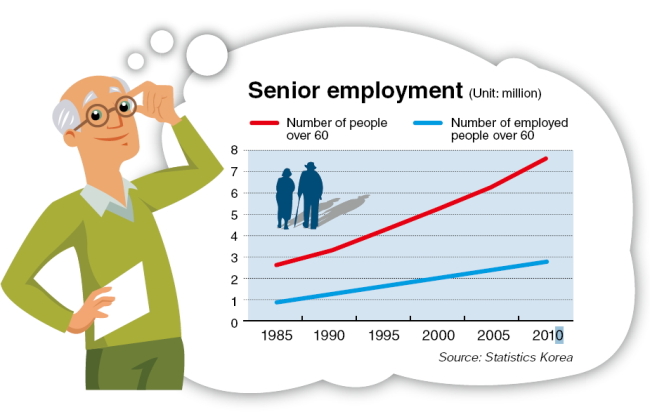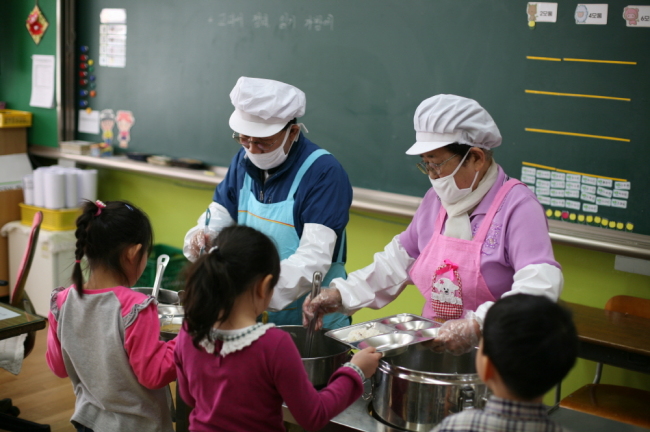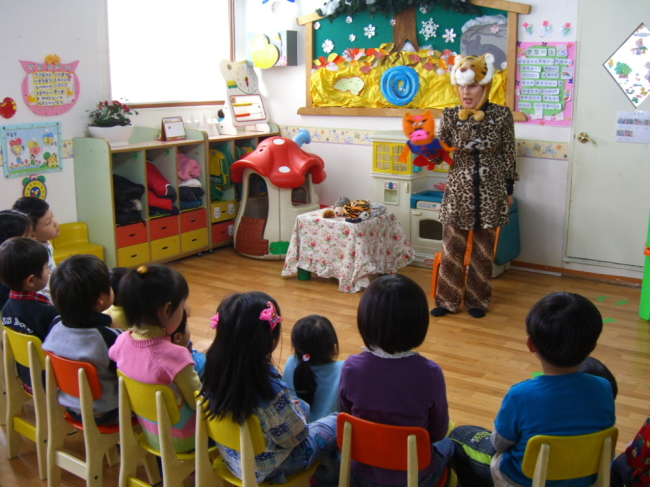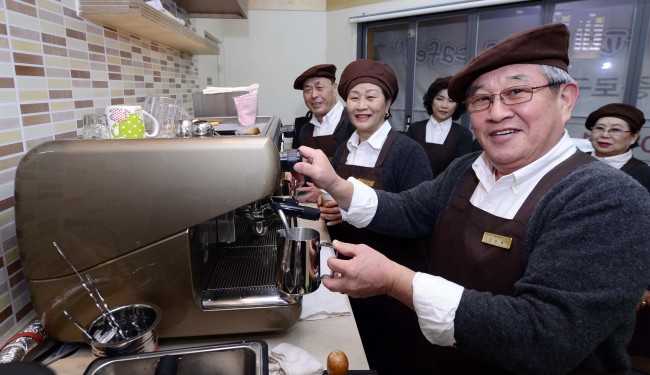Most of the commuters beeping their metro cards at City Hall Station in Seoul hardly notice the pink ribbon strapped around the old man’s chest.
“How may I help you?” the ribbon reads. Above it stares a countenance with wrinkles that belie the satisfaction of working at this seemingly monotonous job.
“The job is very enjoyable,” said Do Yeon-mun, a 78-year-old retired ginseng trader. It’s not because it helps him financially, but because it helps him stay healthy.
“I work three hours in the morning, once every two days. So it doesn’t really put a strain on my life.”
Assistant work at subway stations is common public sector employment created for senior citizens as Korea seeks more jobs for them to address the fast-aging population and rising welfare costs.
Do and coworker Park Won-wook, a 78-year-old retired school teacher, stand at ticket gates and stop those attempting to enter without tickets, and help people with directions and other inquiries.
Working about 36 to 42 hours a month, the workers receive 200,000 won ($182) in monthly wages from the government.
“I’ve been working at this job for eight years now. It does help me financially,” Park said.

Korea’s population is aging at one of the fastest rates in the world. Those older than 65 are expected to account for 24.3 percent of the population by 2030. The figure currently stands at about 11 percent.
Korea’s employment rate for senior citizens is significantly higher than the average for the Organization for Economic Cooperation and Development, but the country has the highest elderly poverty rate.
According to the Prime Minister’s Office, Korea’s senior employment rate stood at 28.9 percent in 2011, while the OECD average came in at 12.3 percent.
However, Korea Institute for Health and Social Affairs data shows that 45.1 percent of Korean households headed by those aged 65 or older lived in poverty in 2011. In comparison, the OECD average came in at 13.5 percent. The figure for senior Koreans living alone came in at over 70 percent.
In the study, households whose incomes were less than half of the median disposable income were categorized as being in poverty, placing those with monthly incomes of about 800,000 won under the poverty line.
Although the government has support programs for low-income groups and senior citizens in place, the poverty rate for senior citizens cannot be reduced through subsidies alone.
The average monthly income of the 3.91 million people who received the basic senior pension last year came in at under 240,000 won, though the pension payout itself ranges from 20,000 won to 154,900 won per household depending on income and marital status.
Faced with budgetary restrains and limits of various pension schemes, the central government has also been placing increasing importance on creating jobs for the elderly.
“Expanding employment is at the core of welfare for the elderly. There is the national pension, but for most people it is not enough,” professor Hur Jun-soo of Soongsil University’s School of Welfare said.
“In this age of 100-year life spans, income must be guaranteed. The national pension is pocket money. That is why senior employment is very important.”
The government spending for creating jobs for seniors went from 16.9 billion won in 2004 to 221.2 billion won this year, and the number of such jobs jumped to 230,000 from 25,000 over the same period.
The government plans to create 50,000 new jobs with the aim of raising the number of jobs for seniors to 430,000 by 2017.
In addition, the government plans to increase the duration of employment for public sector jobs for seniors to one year from the current nine months and raise the monthly pay to between 300,000 won and 400,000 won by the same year.
Regional governments including those of major metropolitan areas such as Seoul and Busan as well as those of provinces have been introducing and expanding employment programs for the elderly.
Seoul City provides a wide range of elderly welfare programs to promote senior citizens’ reemployment.
The city initiated social contribution employment projects divided into the three categories: the public sector, caretaker jobs and education work.
About 22,600 seniors who receive the basic senior pension work in the public sector including schools and subways.
At elementary schools, senior citizens guard students at the gate after school or work at cafeterias.
Public sector work is the most preferred job by the elderly because of availability and convenience. Parents also welcome their assistance as most parents work during the day.
“Parents actually like what the senior citizens do as working couples are unable to fulfill the duties of parents such as visiting schools and helping with children’s lunches at school,” a city official said.
“How may I help you?” the ribbon reads. Above it stares a countenance with wrinkles that belie the satisfaction of working at this seemingly monotonous job.
“The job is very enjoyable,” said Do Yeon-mun, a 78-year-old retired ginseng trader. It’s not because it helps him financially, but because it helps him stay healthy.
“I work three hours in the morning, once every two days. So it doesn’t really put a strain on my life.”
Assistant work at subway stations is common public sector employment created for senior citizens as Korea seeks more jobs for them to address the fast-aging population and rising welfare costs.
Do and coworker Park Won-wook, a 78-year-old retired school teacher, stand at ticket gates and stop those attempting to enter without tickets, and help people with directions and other inquiries.
Working about 36 to 42 hours a month, the workers receive 200,000 won ($182) in monthly wages from the government.
“I’ve been working at this job for eight years now. It does help me financially,” Park said.

Korea’s population is aging at one of the fastest rates in the world. Those older than 65 are expected to account for 24.3 percent of the population by 2030. The figure currently stands at about 11 percent.
Korea’s employment rate for senior citizens is significantly higher than the average for the Organization for Economic Cooperation and Development, but the country has the highest elderly poverty rate.
According to the Prime Minister’s Office, Korea’s senior employment rate stood at 28.9 percent in 2011, while the OECD average came in at 12.3 percent.
However, Korea Institute for Health and Social Affairs data shows that 45.1 percent of Korean households headed by those aged 65 or older lived in poverty in 2011. In comparison, the OECD average came in at 13.5 percent. The figure for senior Koreans living alone came in at over 70 percent.
In the study, households whose incomes were less than half of the median disposable income were categorized as being in poverty, placing those with monthly incomes of about 800,000 won under the poverty line.
Although the government has support programs for low-income groups and senior citizens in place, the poverty rate for senior citizens cannot be reduced through subsidies alone.
The average monthly income of the 3.91 million people who received the basic senior pension last year came in at under 240,000 won, though the pension payout itself ranges from 20,000 won to 154,900 won per household depending on income and marital status.
Faced with budgetary restrains and limits of various pension schemes, the central government has also been placing increasing importance on creating jobs for the elderly.
“Expanding employment is at the core of welfare for the elderly. There is the national pension, but for most people it is not enough,” professor Hur Jun-soo of Soongsil University’s School of Welfare said.
“In this age of 100-year life spans, income must be guaranteed. The national pension is pocket money. That is why senior employment is very important.”
The government spending for creating jobs for seniors went from 16.9 billion won in 2004 to 221.2 billion won this year, and the number of such jobs jumped to 230,000 from 25,000 over the same period.
The government plans to create 50,000 new jobs with the aim of raising the number of jobs for seniors to 430,000 by 2017.
In addition, the government plans to increase the duration of employment for public sector jobs for seniors to one year from the current nine months and raise the monthly pay to between 300,000 won and 400,000 won by the same year.
Regional governments including those of major metropolitan areas such as Seoul and Busan as well as those of provinces have been introducing and expanding employment programs for the elderly.
Seoul City provides a wide range of elderly welfare programs to promote senior citizens’ reemployment.
The city initiated social contribution employment projects divided into the three categories: the public sector, caretaker jobs and education work.
About 22,600 seniors who receive the basic senior pension work in the public sector including schools and subways.
At elementary schools, senior citizens guard students at the gate after school or work at cafeterias.
Public sector work is the most preferred job by the elderly because of availability and convenience. Parents also welcome their assistance as most parents work during the day.
“Parents actually like what the senior citizens do as working couples are unable to fulfill the duties of parents such as visiting schools and helping with children’s lunches at school,” a city official said.

Aside from regular recruiting programs, the city government has created four new job categories that are currently being piloted.
“We will have a comprehensive assessment at the end of this year to decide whether to continue and expand the project,” said a city official.
Seoul City’s efforts to stimulate senior citizens’ careers are not limited to hiring them in the public sector. In order to avoid job competition with the youth while ensuring stable income, the city has designated 76 jobs as appropriate work for the elderly. Those include visiting tutor for multicultural families, street safety guard, elderly consultant and survey conductor. By doing so, the city is developing designated job fields to promote their reemployment.

Seoul and major metropolises are not unique in promoting employment for the elderly.
Seosan, a small city in South Chungcheong Province, has been operating a number of businesses that are designed to provide jobs for seniors in the city.
This year, the city plans to inject more than 1.6 billion won into 21 projects that will create more than 460 jobs for senior citizens, who account for nearly 15 percent of its population.
Projects funded by the city, with support from the central government, include public services such as jobs protecting the environment and cultural assets, as well as market-oriented projects including tofu and soap manufacturing.
Government-funded projects currently account for a large part of jobs for the elderly, and an increasing number of seniors are learning new skills to improve their chances of finding work.
The demand for baristas has increased in recent years along with coffee consumption in Korea, a trend senior job seekers have capitalized on.

The number of senior baristas ― known as silver baristas ― has been on the rise, and a number of caf chains and government-funded “silver cafes” have sprung up across the country.
While related programs appear to be moving in the right direction, Soongsil University’s Hur points out that changes are need to increase the benefit for low-income groups.
“Steps to exclude the high-income groups (from related programs) and to increase the pay for the elderly below the middle-income group are needed.”
According to Hur, the government programs are unlikely to be more than stopgap measures until the means guaranteeing income later in life become established in Korea.
He added that while obtaining the target of 200,000 additional jobs for the elderly would not be a problem, the low pay offered by such jobs limited the efficacy of such programs for those who had no other significant income.
As the authorities give more weight to creating jobs for the elderly, a number of local corporations have also caught on to the idea.
In March, CJ Korea Express established a courier service staffed entirely by seniors in Busan. At present, the company has just over 40 employees, but the figure is expected to reach 300 by the end of the year.
Other companies have taken a less direct approach, choosing to support social enterprises ―- a potential solution to the senior employment issue favored by some welfare experts.
On Aug. 26, SK Innovation announced four businesses designed to create jobs for seniors as part of its plans to promote a “social economy.”
Those selected for SK Innovation’s sponsorship will receive 600 million won over the course of one year, and receive consultations to aid their businesses.
By Choi He-suk, Lee Hyun-jeong and Jeong Hunny
(cheesuk@heraldcorp.com) (rene@heraldcorp.com) (hj257@heraldcorp.com)
-
Articles by Korea Herald



![[AtoZ into Korean mind] Humor in Korea: Navigating the line between what's funny and not](http://res.heraldm.com/phpwas/restmb_idxmake.php?idx=644&simg=/content/image/2024/04/22/20240422050642_0.jpg&u=)
![[Exclusive] Korean military set to ban iPhones over 'security' concerns](http://res.heraldm.com/phpwas/restmb_idxmake.php?idx=644&simg=/content/image/2024/04/23/20240423050599_0.jpg&u=20240423183955)


![[Herald Interview] Why Toss invited hackers to penetrate its system](http://res.heraldm.com/phpwas/restmb_idxmake.php?idx=644&simg=/content/image/2024/04/22/20240422050569_0.jpg&u=20240422150649)
![[Graphic News] 77% of young Koreans still financially dependent](http://res.heraldm.com/phpwas/restmb_idxmake.php?idx=644&simg=/content/image/2024/04/22/20240422050762_0.gif&u=)







![[Exclusive] Korean military to ban iPhones over security issues](http://res.heraldm.com/phpwas/restmb_idxmake.php?idx=652&simg=/content/image/2024/04/23/20240423050599_0.jpg&u=20240423183955)



![[Today’s K-pop] Ateez confirms US tour details](http://res.heraldm.com/phpwas/restmb_idxmake.php?idx=642&simg=/content/image/2024/04/23/20240423050700_0.jpg&u=)